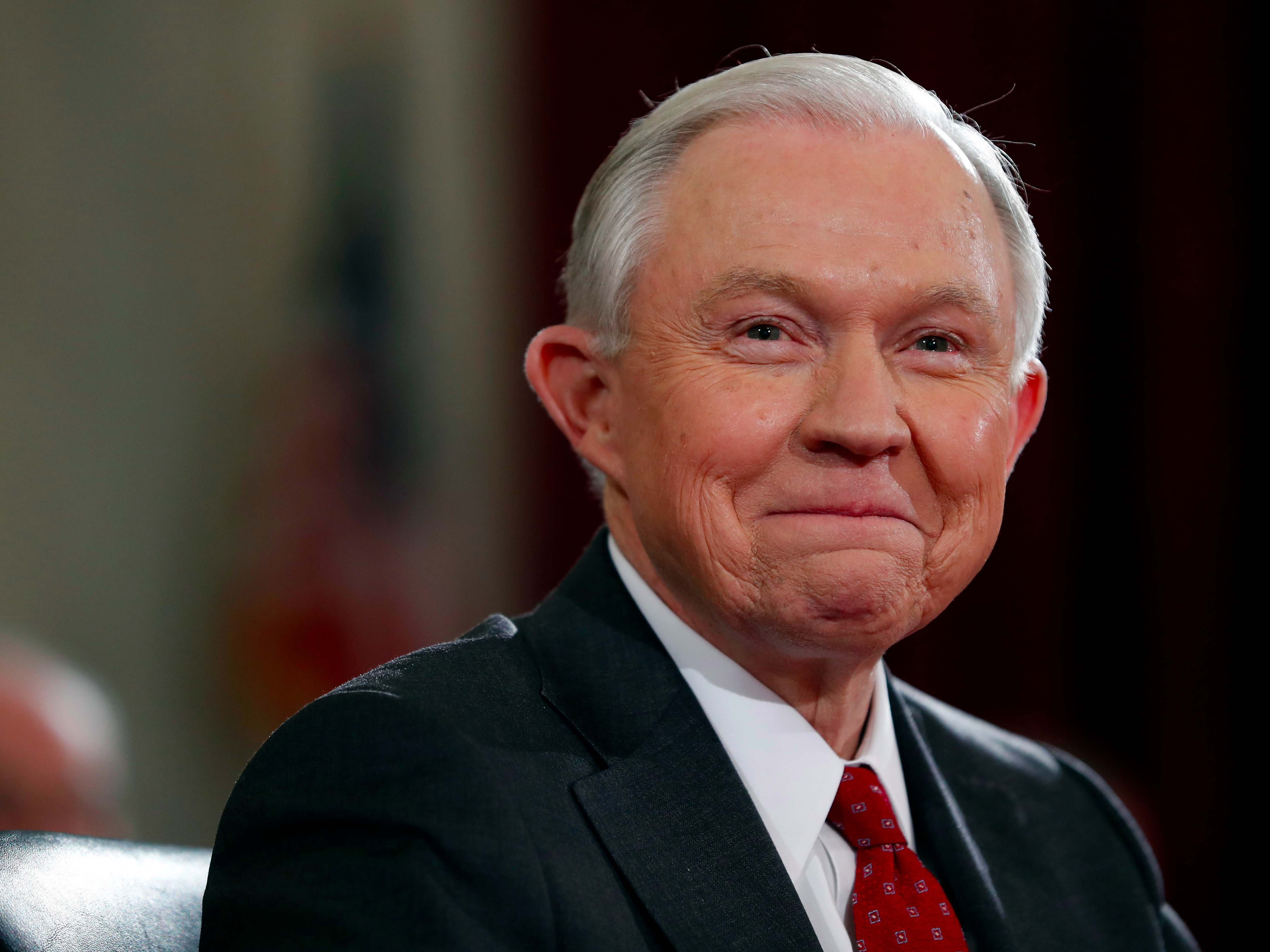Jeff Sessions, one of President Donald Trump’s most controversial cabinet picks, has been confirmed as US Attorney General.
Senators voted 52 to 47 approving Sessions Wednesday night after a confirmation process that turned into a long, bitter fight and culminated in an all-nighter at the Senate on Tuesday. During the session, Democrats argued against the Alabama senator and highlighted their opposition to his record and views.
Democrats fear that any progress the Obama administration may have made on issues from immigration to criminal justice reform will quickly be reversed by the Sessions-led Justice Department.
Bryan Logan contributed reporting.
Here are some of the key issues at stake:
Immigration

Sessions has long been viewed as an immigration hardliner, who as a senator consistently led efforts to defeat immigration bills that would provide paths to citizenship for undocumented immigrants.
Beyond his desire to crack down on illegal immigration, Sessions has also been an opponent of legal immigration. In an opinion piece published in The Washington Post in 2015, Sessions said that low-wage legal immigrants "work, draw benefits and become voting citizens" and "substitute for higher-paid Americans." He also argued that the employment of immigrants in high-skilled sectors "perpetuates the myth that there is a shortage of talented US workers" and replaces qualified American graduates with foreign labor.
Some Democrats, such as California senator Dianne Feinstein, have accused Sessions of wielding some influence in drafting Trump's executive order that temporarily suspended the refugee program and barred travelers from seven majority-Muslim countries. Sessions has denied he was involved.
In his confirmation hearing in January, Sessions categorically denied that he would support a temporary ban on Muslim immigration, which Trump had advocated for during the early stages of his campaign. But Sessions also noted that Trump had since clarified that travel restrictions should only apply to countries that support terrorism.
Sentencing

Despite widespread, bipartisan support for federal drug sentencing reform, Sessions has long opposed efforts to treat drug offenders with leniency. He is in favor of tough, mandatory minimums, and has argued as recently as last year that efforts to overhaul federal drug sentencing would release "violent felons" into the street.
As US Attorney, drug convictions made up 40% of Sessions' convictions - a rate which was double that of other federal prosecutors in Alabama, according to the Brennan Center.
Sessions has since become a strong supporter of eliminating the sentencing disparity between crack and powder cocaine offenses - even back when Congress was largely in favor of harsh sentencing.
Policing

Sessions is widely seen as a police-first candidate for Attorney General, and has won the backing of top police unions and law enforcement groups across the country. During his confirmation hearing, Sessions argued that police have been "unfairly maligned" in recent years and vowed he would support officers.
His stance on policing has thrown the Department of Justice's recent efforts toward police reform into jeopardy, as Sessions has frequently expressed skepticism over federal "consent decrees," which were used increasingly during the Obama administration to attempt to rein in police departments accused of systemic discrimination and unconstitutional policing practices.
Sessions argued that police departments "often feel forced to agree to a consent decree just to remove that stigma and sometimes there are difficulties there."
Voting Rights

Sessions has said he cares about civil rights and voting rights, citing his work as a prosecutor on dozens of desegregation cases. Yet this claim has seen blowback by Democratic lawmakers, journalists, and former Justice Department attorneys who say Sessions vastly overstated his role in the desegregation cases.
Sessions has also cheered on efforts to weaken the Voting Rights Act, which he said during his confirmation hearing was an "intrusive" policy. He has argued that voting discrimination doesn't exist, but that voter fraud does exist and warrants strict voter-ID laws.
Since he was announced as Trump's pick for Attorney General, Sessions has also received renewed scrutiny over a 1985 case in which he prosecuted three civil rights activists for voter fraud. The activists were later acquitted, and the case was cited as one of the reasons - along with making what some argue were racist statements - why he was rejected by the Senate for a federal judgeship in 1986.
Guns

Sessions has long been an advocate of federal prosecution for gun crimes in order to better secure tough sentences, although records have since cast doubt on his claims that his office led the country in gun prosecutions during his 12-year tenure as US Attorney for the Southern District of Alabama.
In his confirmation hearing, Sessions reiterated support for federal prosecution, and touted two programs, Project Triggerlock and Project Exile, that encouraged federal prosecutors to aggressively prosecute local criminals with federal gun laws. Liberals have criticized Project Exile in particular for imposing tougher penalties - which they argue don't deter crime - while failing to curb annual gun murders.
Sessions is viewed favorably by gun-rights advocates, with the National Rifle Association lauding his nomination to the Attorney General post as "great news."
"Sessions knows that aggressive enforcement of existing law is the answer to violent crime-not restricting the rights of law-abiding gun owners," the association said after Sessions' nomination was announced.
Marijuana

Sessions has opposed efforts to introduce marijuana reform, and subscribes to the questionable theory that it is a gateway drug. Last year, Sessions argued that "good people don't smoke marijuana" and it is a "very real danger."
The position puts him at odds with not only Trump, who said during his campaign that marijuana policy should be decided on a state-by-state basis, but with the growing number of states that have opted to legalize recreational and medical marijuana.
Sessions' stance on marijuana has concerned both legalization advocates and sentencing reform advocates, who fear that a Sessions-led Justice Department could cast a wide net in cracking down on drug offenses, reeling in marijuana users along with other offenders.

